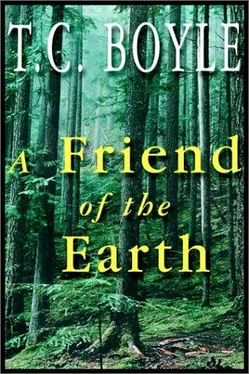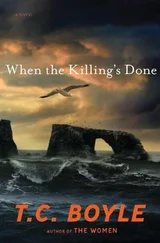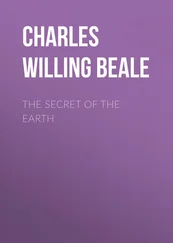"I'm not going to slip up."
She came right back at him: "I know you're not."
He didn't like her tone, heavy with the freight of implication: he wasn't going to slip up because he wasn't going to do anything much more than flap his mouth and wave his hands, that's what she was saying. And further, if he did dare to fish out the watchcap and the greasepaint and bolt-cutters, there would be no more domestic tranquillity, not in this house, and not with this wife. "Listen to yourself," he said. "You sound like some sort of corporate whore. Is that what this is all about-rising to the top of the food chain? Politics? A fat paycheck? Is that what it is?"
She tipped back her head and drained her glass, When she set it down, the base of the glass hitting the tabletop with a force just this side of shattering, he saw how angry she was. "I was out there on the front lines when I was twenty-three years old-where were you?"
"How many species you think were lost when we were running around bare-assed in the mountains? Tell me that," he said, ignoring the question. "How many did we save in those thirty days? And how many roads were built, how many trees came down? Worldwide: Not just in California and Oregon, but worldwide." Tierwater's hand went for the bottle. The wine might have been poison for the environ-. Ment, but it sang in his head. "And while we're on the subject of numbers, how many guys did you fuck while I was in Lompoc?"
It all stopped right there, dead in its tracks.
"Huh?" He demanded, and he felt low, felt like a toad, a criminal, a homewrecker. "I don't hear you? How many? Or was it just Teo?"
She was on her feet now, and so was he. The look she gave him had no reserve of love in it, not the smallest portion. She was beyond exasperation, beyond contempt even. If she'd been a dog — or a hyena or a Patagonian fox-she'd have snarled. As it was, she just jerked her head to take the hair out of her face, turned her back and stalked out of the picture.
And Tierwater? He hit the wall so hard with the bottle he could feel the jolt of it all the way down to the base of his spine. He stood there a minute, the neck of the bottle sprouting from his hand like a bouquet of hard green flowers, and then he went out to the garage to look for the watchcap.
Furniture in lane two, some maniac blocking an on-ramp with his pickup truck and threatening suicide-take your pick. When wasn't there a problem on the freeway? Tier-water sat there, stalled in traffic, fuming. There were cars as far as he could see in either direction, cars hemmed in by apartments and condos, restaurants, parking lots and auto malls, each of them pumping its own weight in carbon into the atmosphere each year, every year, forever. The radio played talk and scandal. A baseball game. Oldies. He listened to the oldies and felt nothing but old. The traffic crept forward like an army converging on some distant objective and he crept with it, cursing his fellow drivers, squeezing the Jeep over one foot at a time until he reached the nearest off-ramp, which just happened to be blocked, along with the surface streets it fed.
Sierra had the right idea. She refused to drive. Refused even to get her learner's permit. The bus is good enough for me, she said. And boys. Boys'lI always take me where I want to go. They're lined up out there, Dad, twenty deep. Boys. Yeah, he said, sure, and he winked, because he wouldn't rise to the bait. But you tell them your heart belongs to Daddy.
That was when-yesterday? A week ago? He was thinking about that, his rage dissipating, the Jeep rolling forward — the whole line moving now, the car at the head of the train lurching into motion, and then the next in line, and the next, motion communicated through hands and feet and gas pedals in an unbroken chain-until he was staring bewildered into the brake lights of the car ahead of him and hitting his own brakes, hard. At the very instant everyone had lurched forward, a boxy little foreign car shot into the gap that opened between the first and second vehicles, and suddenly, all along the line, twenty drivers — the old, the suspect, the drunk, the suffering-were slamming on their brakes in succession. Before he could think-before he could even squeeze his eyes shut or clench his teeth-Tierwater was jerked forward in his seat and wrung back again, as the car behind him rode up his bumper, crumpled the rear end of the Jeep and drove him helplessly into the next car up the line.
He'd never understood what whiplash was until that moment, muscle fibers fraying, the back of his neck and shoulders stinging as if he'd been slammed with a board, blindsided, knocked down for the count, but it didn't prevent him from leaping out of the car to confront the jackass who'd hit him. What was wrong with these people? How could they live like this? Didn't they realize there was a natural world out there?
The smog was like mustard gas, burning in his lungs. There was trash everywhere, scattered up and down the off-ramp like the leavings of a bombed-out civilization, cans, bottles, fast-food wrappers, yellowing diapers and rusting shopping carts, oil filters, Styrofoam cups, cigarette butts. The grass was dead, the oleanders were buried in dust. A lone eucalyptus, twelve thousand miles removed from the continent where it had evolved, presided over the scene like an advertisement for blight. There were shouts in the distance, curses, the screaming, uncontainable blast of one car's horn after another, and sirens, the ubiquitous sirens, playing a thin dirge over it all.
Tierwater wrenched open the door of the car behind him, no need for rationality here, some threshold crossed and crossed again, Andrea, Teo, the shithole that was the human world, and he was capable of anything. Here, here in this ratcheting, stinking, crumpled hulk of steel, was the face of his enemy, an enemy as specific and unequivocal as Johnny Taradash, and he had his left hand on the door handle and his right balled into a fist, all the horns in the world shrieking and then he saw that face and stopped.
She was an Asian girl, seventeen, eighteen, no older than Sierra, with eyes like the bottom of a well and three bright tributaries sectioning her face into a delta of blood, and though he hated everybody and everything, though he had an acetylene torch and a tank of oxygen and a sack of silicon carbide in the back of the Jeep, he reached into the wrecked car, pulled her out and held herein his arms till the ambulance came.
What did that mean to him? Nothing, nothing at all. Sure, there were individuals out there, human beings worthy of compassion, sacrifice, love, but that didn't absolve them of collective guilt. There were too many people in the world, six billion already and more coming, endless people, people like locusts, and nothing would survive their onslaught. It took Tierwater less than a week — the rear end of the Jeep hammered roughly back into shape, his neck immobilized in an antiseptic white brace that would have glowed like a light bulb if he hadn't blackened it with shoe polish — and he was back in action. First, though, he'd had to sit through a dinner with Teo, Andrea and three other E. E! Honchos, at which they discussed things like the electorate, Congress, letter-writing campaigns and ways to attract more green-friendly donors. Teo was wearing a four-hundred-dollar suit. Teo. Liverhead. Sitting there like he'd already been nominated for state senator. Plates of Pilaf Thai, ginger shrimp and glass noodles circulated round the table. Nobody said a word about the earth.
Tierwater excused himself before the dessert came- "My neck's killing me," he said, giving Andrea a pathetic look, "Teo'll drop you off, won't you, Teo?" — and before the hour was out he was parking in a quiet cul-de-sac in a development less than a mile from where General Electric (or the DWP or whoever, it was all the same to him) was rearranging the earth in the name of progress. That was when he got out the shoe-blacking and his watchcap and all the rest. In hindsight, he shouldn't have acted alone. Always work in pairs, that was the monkeywrencher's first rule, because a lookout was absolutely essential, especially if you were wearing welder's goggles and you couldn't move your neck more than half an inch in either direction, let alone look over your shoulder. But he was done with the law now-he'd paid his dues and then some — and he was eager to get back into the game, to act, to do something meaningful. And he was fed up too, terminally fed up, with Andrea and Teo and the rest of the do-nothings. So he took a chance. Who could blame him?
Читать дальше












